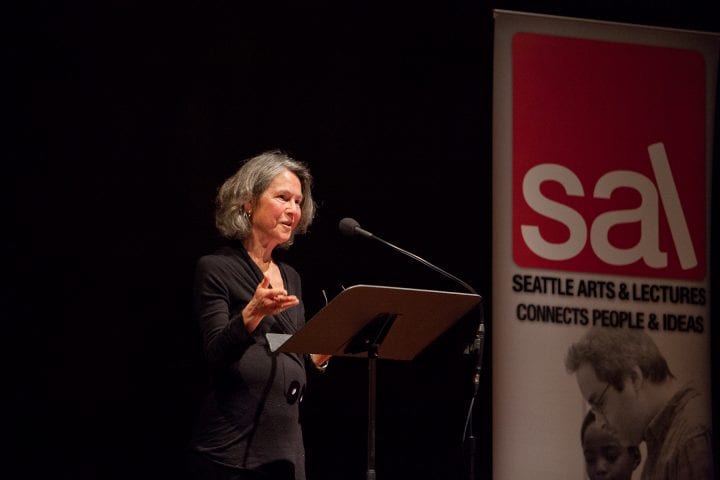Glück’s poetry is sharp and lean, described in the New York Times by William Logan as “the logical outcome of a certain strain of confessional verse—starved of adjectives, thinned to a nervous set of verbs, intense almost past bearing, her poems have been dark, damaged and difficult to avert your gaze from.”
Louise Glück was born in New York City in 1943. Her works of poetry include A Village Life: Poems (2009), Averno (2006), Vita Nova (1999), The Wild Iris (1992), Ararat (1990), and The Triumph of Achilles (1985). She has also published a collection of essays, Proofs and Theories: Essays on Poetry (1994). Averno was a finalist for the 2006 National Book Award in Poetry, and The Wild Iris was awarded the Pulitzer Prize. She was also a judge in the Yale Series of Younger Poets from 2003-2010.
Glück’s poetry originates from the speaker-as-center, utilizing the emotional singularity of the isolated self as a means through which to engage the fundamental webs and events surrounding the “I” of existence, while paradoxically never being governed by the urgent constraints of subjective emotion. Combined with the ability to gaze unflinchingly into the emotional disappointments and rejections of family, work, and love, Glück’s streamlined poems and incisive diction combine to create poems that are brutal in their unrelenting focus, and wholly arresting.
Glück grew up on Long Island where her father, Daniel Glück, helped invent and market the X-Acto Knife, which was originally intended as a surgical tool. While the knife itself proved unsuitable for hospital use, Glück’s own language reflects scalpel-like qualities in the precision and finely honed edges of her lines. When applied to the inner eye of an emotionally conscious self, the razor’s edge of her poetry’s gaze strips away sentimentality, rationalization, and distraction, revealing a poetics that is “bitter, stark, careful, guiltily inward. . .astonishing in its self-knowledge.” (Publisher’s Weekly)
Glück is also the recipient of The Boston Review‘s Bingham Poetry Prize and The New Yorker‘s Book Award in Poetry (for Vita Nova), The Poetry Society of America’s William Carlos Williams Award (for The Wild Iris), the Library of Congress’s Rebekah Johnson Bobbitt National Prize for Poetry (for Ararat), and the National Book Critics Circle Award, the Boston Globe Literary Press Award, and the Poetry Society of America’s Melville Kane Award (for The Triumph of Achilles). She has received fellowships from the Guggenheim and Rockefeller Foundations and the National Endowment for the Arts. Proof and Theories: Essays on Poetrywas awarded the PEN/Martha Albrand Award for Nonfiction. In 2008 Glück received the Wallace Stevens Award for mastery in the art of poetry. She is currently the Rosencrantz Writer in Residence at Yale University.
